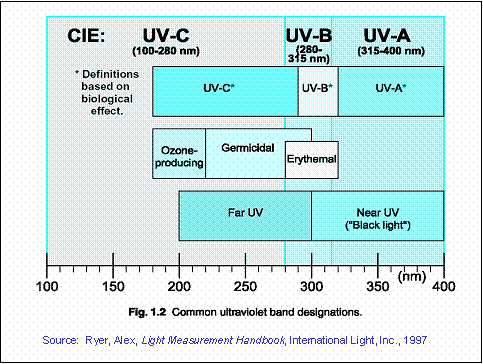Guide to UV Measurement
Wavelength Designation
It is interesting that the language of UV wavelength designations has no equivalent terms to those that describe the visible wavelength spectrum such as “red,” “yellow,” “green” or “blue.” Historically, the technology was forced to adopt terms from the field of physiology where “UVA”, “UVB”, and “UVC” are generally accepted designations for distinct UV ranges, differentiated by their effects on biological tissue. UV curing technology, having no designations of its own, adopted these. When used to describe the UV curing process, UVA, UVB, and UVC are only loosely defined, having been modified slightly to represent dominant emission ranges in the emission of mercury (Hg) vapor plasmas.
Similar designations are used in various technologies involving UV. Typically, the generally accepted range designations are:
- UVC 100-280 nm
- UVB 280-315 nm
- UVA 315-400 nm
For convenience, the UVC range is further split since wavelengths below 200 nm are absorbed by air and are generally not of practical value in industrial UV curing. With this modification, the wavelength designations for UV curing become:
- UVV 100-200 nm
- UVC 200-280 nm
- UVB 280-315 nm
- UVA 315-400 nm
